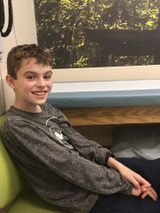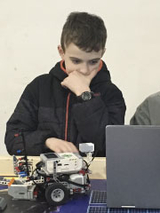Gluten Sensitivity: Logan’s Story
Gluten Sensitivity: Logan’s Story
Four years ago, Logan had trouble concentrating and putting on weight and had a very limited diet. Today, he's a healthy 9-year-old who is getting enough nutrition to help his body grow so he can pursue his passion: robotics.

Logan was 5 years old when he began experiencing serious digestive issues. He had trouble gaining weight, severe constipation, and he was often tired and emotional. At an outside hospital, Logan was thought to have a diagnosis of celiac disease. Although he initially showed signs of improvement, Logan’s symptoms returned.
Logan’s mother, Elizabeth brought him to CHOP’s Center for Celiac Disease, where a team of clinicians reviewed his previous labs and pathology which showed intestinal damage, but not classic findings in celiac disease. The team went to work, performing a series of tests as well as celiac genetics to formulate a treatment plan for his ongoing weight loss and determine a diagnosis of gluten sensitivity versus potential celiac disease.
Arunjot Singh, MD, MPH, and dietitian Kara Feigenbaum, RD, CDE, LDN, from the Center for Celiac Disease, took a holistic approach to Logan's care and treatment. Instead of just restricting Logan's diet, the team looked at the entire family’s needs and created a lifelong treatment plan that his family could embrace and be part of.
Elizabeth says:
“I was very thankful that Dr. Singh looked at Logan as an individual and was willing to consider the uniqueness of his symptoms. The entire team worked to help us find answers to the questions we had struggled with for years.”
One of the first issues the team addressed was Logan's trouble maintaining his weight. Always small for his age, Logan continued to lose weight as his family tried to find gluten-free foods that he would eat. Without enough nutrients being absorbed by his body, Logan began experiencing other distressing symptoms — he had trouble concentrating, he had emotional outbursts, and he was unable to focus on his schoolwork.
Feigenbaum identified key ingredients to incorporate into his diet to help him gain weight and regain mental clarity.
“At first, he had just been avoiding gluten,” says Elizabeth. “The dietitian helped us find the fats and proteins Logan needed to gain weight, and told us which foods contained the fats his brain needed to remain clear, like healthy butters and oils.”
Taking control of his disease
Logan is also very proactive about managing his condition and monitoring his diet, making sure those around him — even his peers on his Lego team — are informed so he can avoid accidental ingestion of gluten.
“His whole team has embraced his difference and has been very supportive,” Elizabeth says. “He’s the type of kid who likes to solve problems. He’ll organize his cabinet to clear out the gluten-containing items; and when we are at a restaurant, he’ll make sure everyone knows they must clean the grill before they made his food. He takes this extra step to make sure he stays healthy.”
Nevertheless, Logan and his family wondered the extent of his gluten intolerance. In the past year, Logan has accidentally ingested gluten a few times, but did not experience any symptoms.
Dr. Singh and Logan's family are now conducting a gluten food challenge to determine if Logan, under the supervision of his care team, can begin to incorporate gluten back into his diet.
“Dr. Singh helped us to reintroduce gluten to Logan’s diet and monitor the results,” says Elizabeth. “We watched his weight to make sure he wasn’t losing any pounds, and we checked in with the doctors regularly. Right now, he’s on an unrestricted diet to see if his body still reacts to gluten."
Results from a recent endoscopy are promising: Logan's body didn't show any negative reactions to gluten. His growth and weight gain have also markedly improved. Nevertheless, his gluten-related disorder is unique and long-term monitoring is needed before any permanent changes are made to his diet.
Full steam ahead

Today, Logan is three years ahead of his peers in math. He refuses to let his condition prevent him from pursuing his interests, especially his favorite hobby: robotics.
“Logan started with the Lego® League team four years ago,” says Elizabeth. “During his first year at the First Lego League level, his team qualified to compete in the World Championships as one of the youngest teams in the event."
Logan uses Legos and coding to program the robots he builds to do certain tasks. Then, he presents research on his findings.
"This year, he was trying to solve problems in long-term space travel, so NASA was involved in the project as well,” Elizabeth says. Logan’s recent project centered on the behavioral and mental health of astronauts.
“I wanted to make them feel less homesick in isolated space. One solution we thought of was playing games," Logan says. "So, I studied games and information, and the different types of games available to help astronauts stay connected to their families at home and to give them an option for entertainment.”
Individualized care
Elizabeth is thankful for CHOP and says the hospital’s family-centered approach to care helped her learn about his condition, and how it could affect his life, personality, and interactions with his family.
Dr. Singh’s approach also helped her understand that her son was not simply a case to be treated, but a child with unique needs that had to be acknowledged.
“Dr. Singh said, ‘Here, we don’t adhere to the norms; people don’t fit into a box. When people come who are different, we keep working and keep looking to find a solution to their individual needs,’” says Elizabeth.
“When I heard that, tears welled up in my eyes because I had been waiting for so long to hear a doctor say that.”